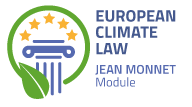1. International seminar: “Climate-induced migration: recent trends and future directions”, organized by the Centre D’Estudis de Dret Ambiental de Tarragona (CEDAT) – Monday 24th April 2023.
2) Academic Paper: “¿Qué debería ser un migrante climático para el derecho internacional?” Revista Catalana de Dret Ambiental, Vol. 14, issue 1, 2023
https://raco.cat/index.php/rcda/article/view/419661
3) International Conference: Towards a Legal System in Harmony and Peace with Nature, Panel IV: Addressing Environmental REfugees’ needs: Main legal challenges and opportunities ahead.
4) Focus Group on Climate Migrations on the topic “Social strategies to confront climate migrations” organized by the Ecology and Development Foundation (ECODES). Madrid, April 25, 2024. With the participation, among others, of representatives of Greenpeace, Entre Culturas, Ayuda en Acción, Alianza por la Solidaridad.
5) Publication of Book Chapter by Borràs-Pentinat, S. “The climate refuge in the European Union: the other forgotten migration” in Corti Varela, J., Jarillo Aldeanueva A. European Climate Law: Union Policies and External Action , Tirant lo Blanc, 2024, pp. 81-118.
6) Presentation “Climate-displaced People arriving in Spain” at International Conference SOCIOECOS 2024 Climate Change, Sustainability and Socio-ecological Practices, June 6-7, 2024
7) Presentation “Climate migrations: conceptualization and challenges” at the VII International Congress of Development Studies, Just Transitions and Pacts for Sustainable Development, May 30-31, 2024
8) Presentation “Climate displaced people: approach to the debate in Spain” at GT21 (Sociology and Environment) within the XV Spanish Congress of Sociology, June 26-29, 2024.
https://www.conftool.com/fes2024/index.php?page=browseSessions&form_tracks=23&form_topic=0
9) Presentation “Migraciones climáticas: aproximación al debate en España”. at XV Congreso Español de Sociología. Sevilla, 26-29 junio 2024.
10) Presentation “Migraciones climáticas: análisis del debate en España”. at I Congreso Internacional de Estudios Socioambientales. 5-7 noviembre 2024.
https://web.ua.es/es/congreso-internacional-estudios-socioambientales/programa-e-instrucciones.html
11) Research Seminar presenting the work in progress report of the project ADAPTAR. Discussants: Gloria Fernández Arribas (UPO), Verónica Laorden Pavón (CEAR), María Cruz Fajardo Vizcayo (independent scholar). 25 November 2024. Council meeting room, UNED Central Library.
12) Presentation “Enforcing International Environmental Law through Refugee Law/International Human Rights Law: The Case of Climate Displaced Persons” at International Conference the Crossroad of International Environmental Law Enforcement, European Society of Internacional Law, 2-3 December 2024.
https://blogs.uoc.edu/edcp/es/the-crossroad-of-international-environmental-law-enforcement/
14) Participation in the “XXIII Annual Report by CEAR: Refugees in Spain and Europe” (March 2025), with a chapter in the “To Learn More” section titled “When Climate Change Pushes Towards the Sea: Displaced People from Senegal” (Justo Corti Varela and Carmen Lozano-Cabedo, pp. 141–146). The report was presented at the Spanish Congress on June 16, 2025.
Report: https://www.cear.es/wp-content/uploads/2025/06/CEAR_XXIII_INFORME_ANUAL_2025.pdf
Presentation: https://app.congreso.es/AudiovisualCongreso/audiovisualEmisionSemiDirecto?codOrgano=497&codSesion=405&idLegislaturaElegida=15&fechaSesion=16/06/2025
15) Radio program “Climate Displaced People: A Reality”. Featuring Verónica Laorden (CEAR), Álvaro Jarillo (UNED), and Justo Corti Varela (UNED). 23 May 2025.
https://blogs.uned.es/derechoclimatico/?p=9579&lang=en
16) Roundtable at the seminar “Refugees, Forced Migration and Peace”, as part of the Peace and Mobilities network, titled “Climate Change and Forced Displacement”. Event organized by the University Institute for Migration Studies (Universidad Pontificia Comillas) together with other network members on May 28, 2025.
https://blogs.uned.es/derechoclimatico/wp-content/uploads/sites/269/2025/10/Comillas-Program_final-version-2.pdf
17) Extension Course “Environmental Displacement and International Law: Current State and Protection Pathways for the Displaced” (October 7–9, 2025).



